News & Media
Conversations with former President and Unisa Chancellor, Dr Thabo Mbeki
The Thabo Mbeki African School of Public and International Affairs at Unisa hosted its flagship interactive engagement event, entitled "Conversation with former President Dr Thabo Mbeki", on 13 March 2024 at the Unisa Muckleneuk Campus. The platform allows the Unisa community and alumni of the school to intellectually engage with Mbeki on socio-economic and political issues, as well as local and international affairs.
Prof Thenjiwe Meyiwa, Vice-Principal: Research, Postgraduate Studies, Innovation and Commercialisation, said since the establishment of the Thabo Mbeki African School of Public and International Affairs, Unisa has remained committed to fostering public discourse and engaged scholarship. She continued: "This collaboration aims to train leaders who can tackle Africa's complex issues, and it is also instrumental in shaping a better future for our continent."
"As we convene this year," said Meyiwa, "we do so amidst a South Africa that celebrates thirty years of freedom and democracy."
Meyiwa expressed that despite notable milestones, the local and global landscapes remain dynamic and fraught with challenges. However, she noted that the conversation with Mbeki serves as a solution-driven forum for pragmatic intellectual discourse exchange and aligns with the institution's core mission as a centre of higher learning, positioned to address challenges globally and locally.
An example to us all
Prof Sibusiso Vil-Nkomo, Executive Dean of the Thabo Mbeki African School of Public and International Affairs, said Mbeki remains a leader and pillar of strength and hope for South Africa and the continent. He added: "We need hope, for without it, there is no progress towards the future." Vil-Nkomo remarked that Mbeki's candidness, clarity and analysis of matters about the country, continent and the world are a source of inspiration for many, especially young people who must take the baton forward. He urged: "We therefore challenge our students to be high achievers, economists, diplomatic and intellectually sound, just like Mbeki."
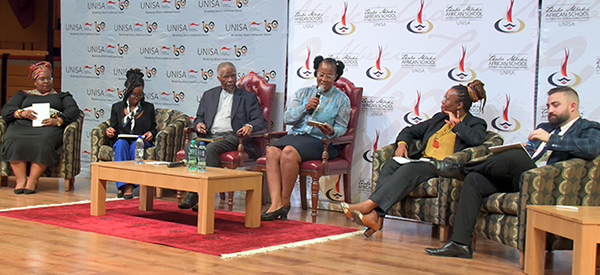
Prof Sibusiso Vil-Nkomo
Unisa National Student Representative Council (NSRC) President, Nkosinali Mabilani, presented a plethora of socio-economic challenges faced by the everyday South African, more so students, hoping to better their lives through education and the aid of government.
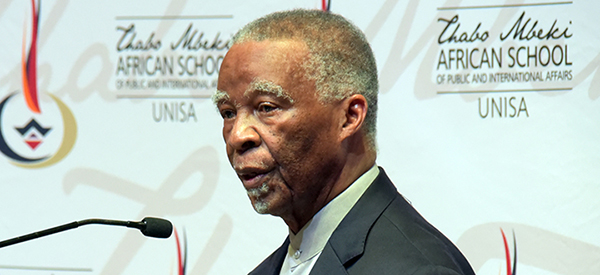
Nkosinathi Mabilani
He presented examples of students who struggle to get employed after graduating, those who cannot have funding for their postgraduate qualifications and those who have difficulty making ends meet with the government's social grant provision. However, Mabilani hoped that the tide would make a practical turn towards South Africa's youth through the discussions presented in the event's dialogue.
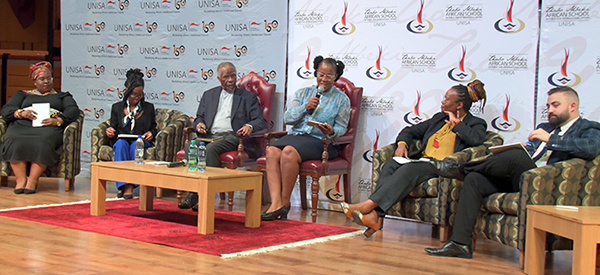
Panel discussants, from left: Thembisile Mahuwa, Dineo Moea, Dr Thabo Mbeki, Prof Edith Phaswana, Dr Palesa Sekhejane and Jonathan Rankin
Panel discussions
During the discussion, panellists Dineo Moea, Consumer Scientist; Dr Palesa Sekhejane, interim Executive Head at the Human Sciences Research Council (HSRC); Jonathan Rankin, astute academic and Wealth Manager; and Thembisile Mahuwa, award-winning lawyer, recognised as one of the Top 30 Most Memorable Women of 2023 in South Africa, joined Dr Mbeki and Director of TM-School, Dr Edith Phaswana, in an engaged discourse aimed at addressing and resolving some of the country's woes ranging from economic, social and political, among others.
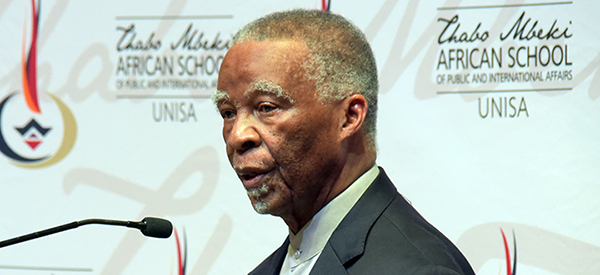
Unisa Chancellor, Dr Thabo Mbeki
Answering the questions, Mbeki said: "I think as a country, we don't understand South Africa in the same way; hence, we come with different solutions for the challenges." He stated that the country's 30 years of democracy had different periods within which it gained socio-economic prosperity after the first post-apartheid elections and gradually took a decline after political interference within the revenue services and other entities owned by the state.
The conversation with the Former President and Unisa Chancellor ignited thought-provoking discussions and inspired innovative solutions to our time's pressing challenges. The discourse fostered a positive change in the social, economic and political landscape through reflection on the country's 30 years of democracy.
* By Godfrey Madibane, Acting Journalist, Department of Institutional Advancement
** Photography by Shooheima Champion, Multimedia Centre
Publish date: 2024/03/14
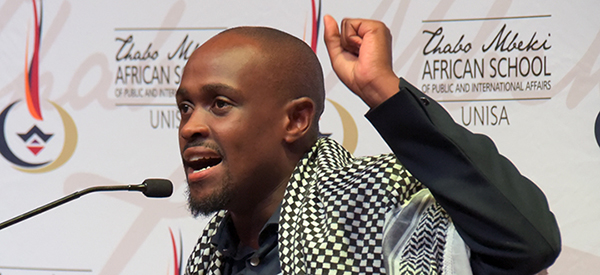

 Unisa co-hosts G20 community outreach in the Eastern Cape
Unisa co-hosts G20 community outreach in the Eastern Cape
 Unisans gain membership of prestigious science academies
Unisans gain membership of prestigious science academies
 Advocating for disability transformation through servant leadership
Advocating for disability transformation through servant leadership
 Unisa Press continues to illuminate the publishing space
Unisa Press continues to illuminate the publishing space